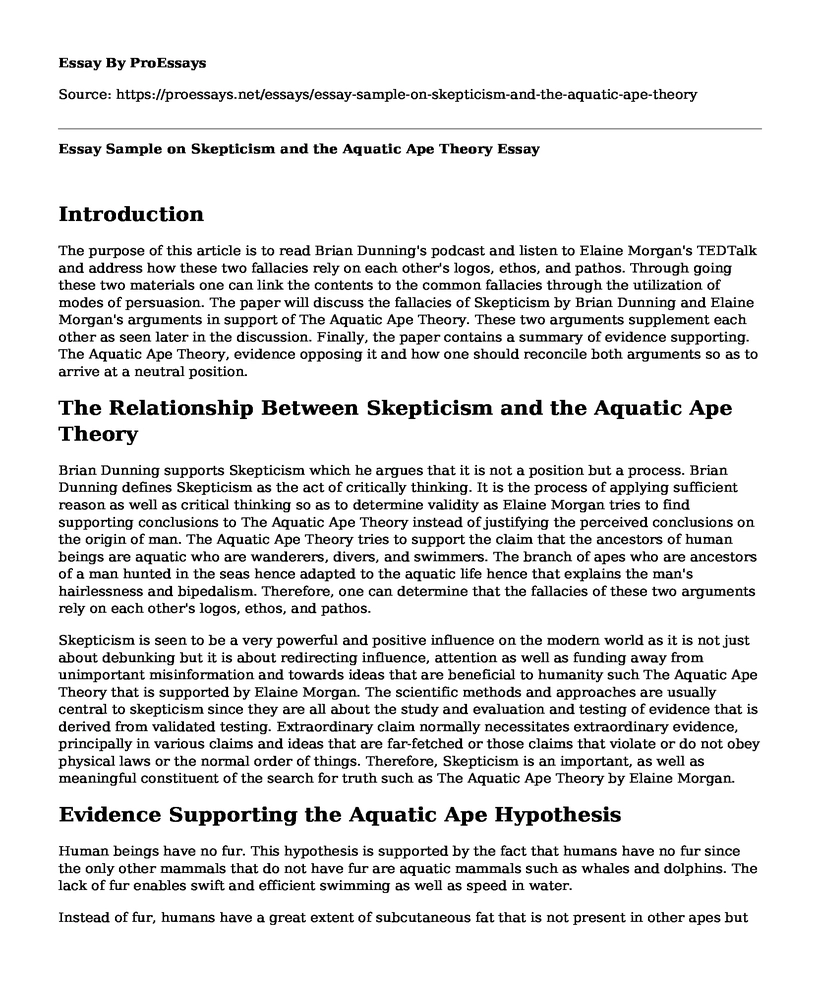Introduction
The purpose of this article is to read Brian Dunning's podcast and listen to Elaine Morgan's TEDTalk and address how these two fallacies rely on each other's logos, ethos, and pathos. Through going these two materials one can link the contents to the common fallacies through the utilization of modes of persuasion. The paper will discuss the fallacies of Skepticism by Brian Dunning and Elaine Morgan's arguments in support of The Aquatic Ape Theory. These two arguments supplement each other as seen later in the discussion. Finally, the paper contains a summary of evidence supporting. The Aquatic Ape Theory, evidence opposing it and how one should reconcile both arguments so as to arrive at a neutral position.
The Relationship Between Skepticism and the Aquatic Ape Theory
Brian Dunning supports Skepticism which he argues that it is not a position but a process. Brian Dunning defines Skepticism as the act of critically thinking. It is the process of applying sufficient reason as well as critical thinking so as to determine validity as Elaine Morgan tries to find supporting conclusions to The Aquatic Ape Theory instead of justifying the perceived conclusions on the origin of man. The Aquatic Ape Theory tries to support the claim that the ancestors of human beings are aquatic who are wanderers, divers, and swimmers. The branch of apes who are ancestors of a man hunted in the seas hence adapted to the aquatic life hence that explains the man's hairlessness and bipedalism. Therefore, one can determine that the fallacies of these two arguments rely on each other's logos, ethos, and pathos.
Skepticism is seen to be a very powerful and positive influence on the modern world as it is not just about debunking but it is about redirecting influence, attention as well as funding away from unimportant misinformation and towards ideas that are beneficial to humanity such The Aquatic Ape Theory that is supported by Elaine Morgan. The scientific methods and approaches are usually central to skepticism since they are all about the study and evaluation and testing of evidence that is derived from validated testing. Extraordinary claim normally necessitates extraordinary evidence, principally in various claims and ideas that are far-fetched or those claims that violate or do not obey physical laws or the normal order of things. Therefore, Skepticism is an important, as well as meaningful constituent of the search for truth such as The Aquatic Ape Theory by Elaine Morgan.
Evidence Supporting the Aquatic Ape Hypothesis
Human beings have no fur. This hypothesis is supported by the fact that humans have no fur since the only other mammals that do not have fur are aquatic mammals such as whales and dolphins. The lack of fur enables swift and efficient swimming as well as speed in water.
Instead of fur, humans have a great extent of subcutaneous fat that is not present in other apes but in aquatic mammals. The fat offers buoyancy and insulation from the very cold water.
The bipedal and standing upright on two legs also suggests an aquatic adaptation as it helps in wading in great depths.
Evidence Opposing the Aquatic Ape Hypothesis
Claims made by aquatic ape supporters about body fat is wrong as humans do not have subcutaneous fat hence it is unlike that the fat came about due to an adaptation mechanism.
Bipedalism develops only on the land animals hence it is not an aquatic adaptation but all aquatic mammals either have four legs or no legs at all.
Humans have big sebaceous glands that make the skin nice and oily which is a characteristic of terrestrial life.
Neutral Position
Both those who argue for and those that argue against the Aquatic Ape Hypothesis have supporting evidence. However, both have loopholes that have not been explained yet.
Questions for Both Parties
Those Supporting the Aquatic Ape Hypothesis
- Why don't humans have scales or gills for better breathing?
- Which another aquatic animal is bipedal?
Those opposing the Aquatic Ape Hypothesis
- Why do humans not resemble any terrestrial animal in their swimming capabilities?
- Why do human lack furs like other terrestrial animals?
Works Cited
TEDTalk, "Elaine Morgan Says We Evolved From Aquatic Apes." YouTube, Uploaded by TEDTalk, 31 July 2009, https://www.youtube.com/watch?v=gwPoM7lGYHw
Cite this page
Essay Sample on Skepticism and the Aquatic Ape Theory. (2022, Nov 16). Retrieved from https://proessays.net/essays/essay-sample-on-skepticism-and-the-aquatic-ape-theory
If you are the original author of this essay and no longer wish to have it published on the ProEssays website, please click below to request its removal:
- Adult Learning and Technology Essay
- Gardner's Multiple Intelligences Assessment Paper Example
- An Indigenous History of the American People by Dunbar-Ortiz Essay
- IQ Intelligence Essay Example
- Civilization Concerning Gender, Class and Religion Essay
- Western Civilizations: Their History and Their Culture
- Essay Sample on Importance of Rivers in First Civilization







